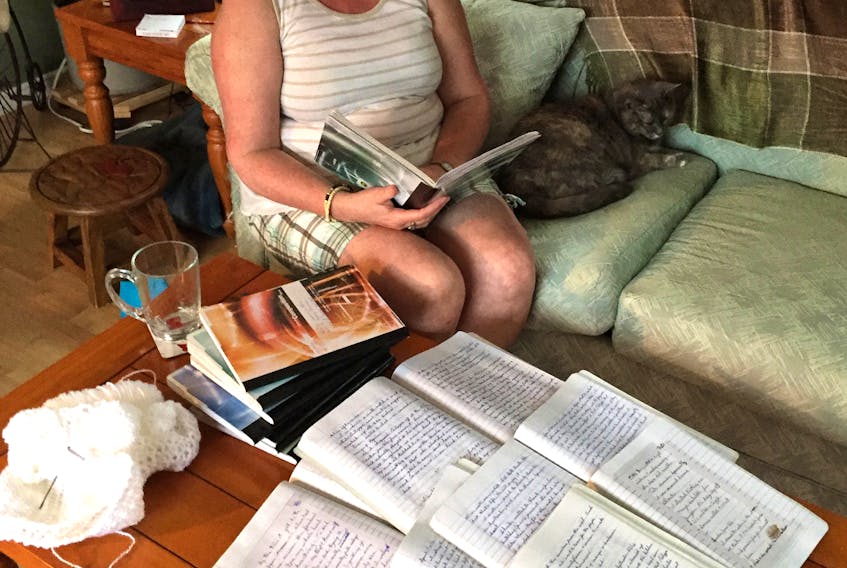ANTIGONISH, N.S. - Stacked on a nearby coffee table in her living room sit more than a dozen notebooks.
They are filled with handwritten entries, recounting memories that, more often than not, she can’t recall.
Passages mark ups and downs in her recovery, one that continues.
“It is as raw as can be,” says Vangie Babin.
With tears welling, she notes she hadn’t read any in more than three years, when she stopped writing them.
“I can’t even do it – it just triggers something.”
She closes one and replaces it on the pile.
How they got here
Richelle MacLaughlin was visiting her mother in Manitoba and stopped at a grocery store to do some shopping.
“It was just so random,” she said.
“The next thing I knew, I was looking at the ceiling and wondering what had happened.”
Liquid detergent had spilled in an aisle. She slipped.
Bruised, literally from head to toe, the Antigonish woman made it back to her mother’s apartment.
“I was just, progressively, not feeling great. I was in so much pain and I felt very nauseous.”
On visiting a doctor, the focus was on her body pain; a head injury wasn’t on the radar.
She flew home days later, accompanied by that constant nausea.
It continued for a few weeks, along with a chronic headache. There was vision impairment and sensitivity to light and noise.
She had no way of knowing at the time, but all are common concussion symptoms.
More than five weeks after the fall, she was diagnosed with a severe concussion, double whiplash, soft tissue damage and spinal issues.
That’s when MacLaughlin found out a blow to the head isn’t necessarily a factor with concussions.
In the case of Vangie Babin, there was no mistaking the cause. She was skating.
“It was like it was happening in slow motion,” she said.
“They heard the crack of the helmet on the other end of the ice.”
Like MacLaughlin, she wasn’t thinking head injury, little knowing it would be the first of three concussions.
READ MORE:
• ‘Our approach has changed a lot’: Antigonish concussion expert
• Times change: Antigonish ex-pro hockey players see progress in concussion management
• ‘Education needs to be reinforced yearly’: Antigonish coach
• ‘All we have is hope’: Antigonish women talk about life after head injuries
Days later, at a conference, Babin leaned into a vehicle to greet someone.
“I whacked my forehead on the door frame,” she said. That recent skating fall had affected her depth perception.
Later that day, during a role-playing exercise, what most thought was impeccable acting was actually the onset of symptoms of a second concussion.
“My head started to pound and I was cupping my head in my hands. I kept saying I couldn’t take it anymore – you need to do something,” Babin recalled.
That October day, she was diagnosed with a concussion – in reality, her second.
Months later, in January, Babin struck her head while removing something from the car.
“I just stood there and cried. I was grateful that I was home, but I remember thinking, ‘Lord, just put me in a freaking bubble,’” she said.
Two years later, MacLaughlin describes the aftermath of her concussion as “horrible.”
“Scrolling on a computer – to this day – still bothers me,” she said.
In fact, it forced her to leave her desk job.
Then, there was the perception people were judging her. There were comments about all the “free time” she was enjoying.
“I didn’t want that. It was really difficult, and I struggled with that,” she said.
Now, MacLaughlin couldn’t care less about what people say or think.
Like her, Babin felt judged. That changed.
“After a while, you don’t care what it looks like,” she said. “You don’t care about what other people are going to think, you just want to get your life back to, not even where it was, but just somewhere where you can function normally.”
Relentless symptoms
There have been days for both women when they couldn’t get out of bed; the headaches, sensitivity to light and nausea, just a few of the lingering effects.
Babin’s home often has to be kept in darkness.
“I am sure Philippe felt like he was living in a cave,” Babin said, referring to her husband.
There were periods of time off work, and the loss of memory.
“Even to this day, my short-term memory – I call it my processing – has changed,” MacLaughlin said.
If she doesn’t write things down she may not remember specific parts of a conversation.
“It is not that I am not taking the information in – it is like I am filing it, in a manner, for me to retain all the information. It is just taking more time.”
There can be a struggle with words.
“There are a lot of times that I know it – I either can’t get it or the wrong word will come out,” Babin said.
She came to truly understand anxiety.
“I knew it, intellectually, but I got it – loudly and clearly – because of all the symptoms. I wasn’t going out,” she said.
And when memory fails, emotions bubble over.
Babin recalled a chance encounter with a woman she knew. No matter how hard she tried, she couldn’t remember her name.
She was honest, noting how the concussion had affected her memory. Rather than giving her name, the woman told Babin the letter it started with.
“It is not a game – I am no longer interested. Just tell someone your freaking name,” she said, anger rising in her voice.
Other senses have also been affected, sometimes in quirky ways.
“I used to always eat my eggs sunny-side up; I liked them runny so I could dip my toast in them,” MacLaughlin said.
“Now, they gross me out. I gag when someone has poached or runny eggs.”
Before Babin’s concussion, contact with citrus brought on a cold sore. Today she can enjoy an orange.
“It is like the brain rewired itself, or something, I don’t know, so I say that’s one of the good things that came out of the concussions,” she said with a smile.
MacLaughlin must be wary “if I am getting close to hitting that wall.” When she tires of walking, she begins leaning to the left. Sitting for long periods is out; she can’t travel for more than a few consecutive days.
“I had to start crossing days out in my planner,” MacLaughlin concedes.
“That was very, very hard for me to do. I actually learned how to say ‘no’ and that was huge.”









